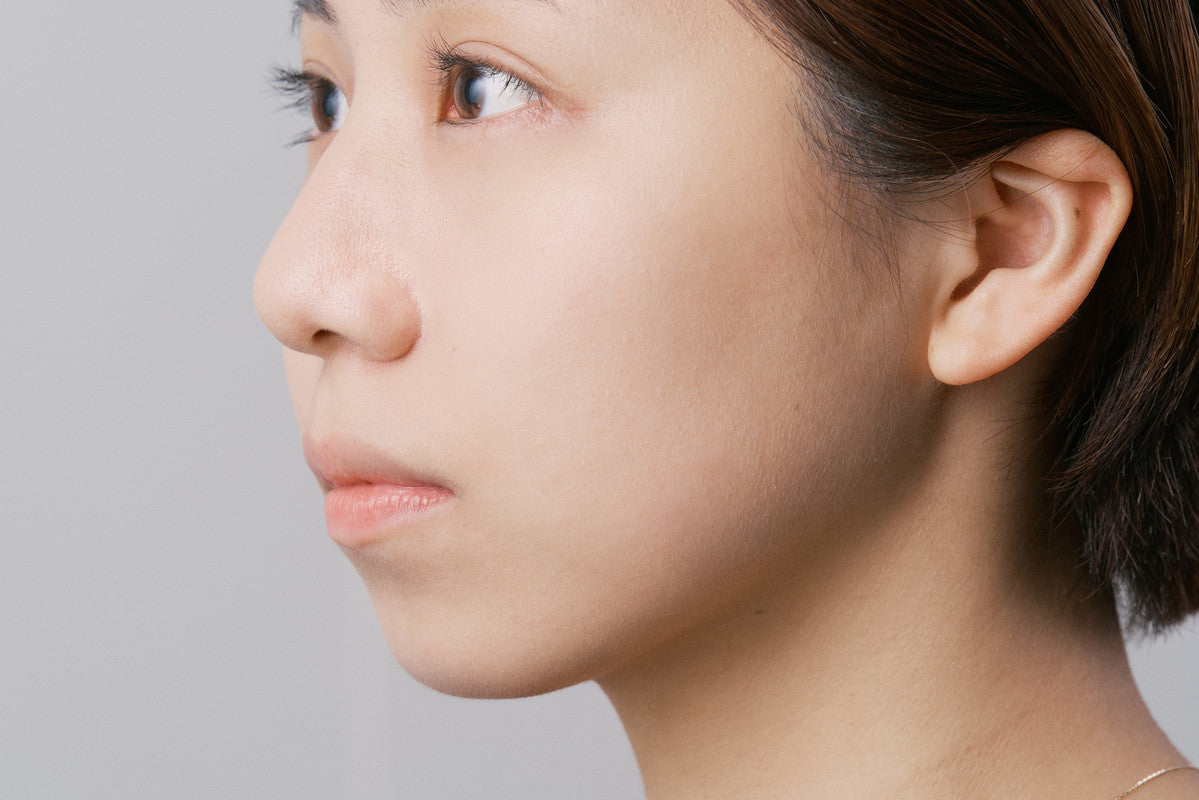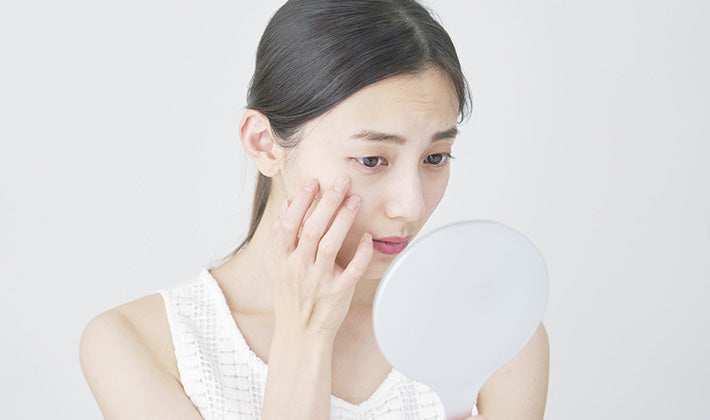
#Skin Problem
2024/07/19
The Culprit Behind Skin Aging: Glycation
Topic
What is Glycation?
Glycation is the covalent attachment of a sugar to a protein, lipid or nucleic acid molecule.
When we consume excess sugar, our blood sugar levels rise.
The surplus sugar then attaches to proteins and lipids in our body,
creating harmful molecules called Advanced Glycation End Products (AGEs).
This process, also known as the Maillard reaction, damages proteins like collagen, essential for skin elasticity.
As AGEs accumulate, they accelerate skin aging, leading to wrinkles, sagging, and age spots.
Why Does Glycation Occur in Skin?
Just like sugar syrup caramelizes with heat, unconsumed sugar in our bloodstream interacts with proteins, triggering inflammation and leading to glycation. This phenomenon contributes to various skin issues, including dullness, sagging, fine lines, and age spots. Listed below are several lifestyle habits related to the risk of glycation.
The more items that apply to you, the higher your risk of glycation, indicating a need to readjust your daily diet and lifestyle.
- Preference for wheat products such as bread and noodles
- Habit of eating rice first during meals
- Fondness for sweets and sugary drinks
- Feeling drowsy after meals
- Frequent stress
- Less than 6 hours of sleep, difficulty falling asleep, or waking up easily in the middle of the night
- Lack of exercise habits
- Insufficient vegetable intake
Reasons for Skin Glycation
As mentioned above, glycation occurs due to excessive sugars in the body.
While sugars are essential for maintaining bodily functions, excess sugars circulate in the blood stream.
Sugars possess the inherent ability to bind with proteins. When sugars encounter proteins, they form bonds that degrade these proteins, resulting in the formation of Advanced Glycation End Products (AGEs). The main sugars that cause glycation of proteins and lipids are glucose and fructose. Glucose enters the bloodstream, where it is transported to cells throughout the body. During this process, it triggers glycation reactions, leading to the production of AGEs. In contrast, fructose has a glycation rate more than 10 times faster than glucose, making it particularly prone to forming AGEs.
Who is Prone to Glycation?

While the accumulation of AGEs is inevitable with age, the rate at which it occurs can vary significantly.
Even individuals of the same age can experience different levels of glycation due to varying diets and lifestyles.
Several factors can increase the risk of glycation:
- High post-meal blood sugar levels
- Frequent consumption of sweets and sugary drinks
- Eating too quickly
- Maintaining the same dietary habits as in younger years
High post-meal blood sugar levels
AGEs form rapidly within an hour after eating, particularly when blood sugar levels peak.
Regularly exceeding 150-200 mg/dL post-meal warrants attention.
Frequent consumption of sweets and sugary drinks
These lead to a rapid influx of sugar into the bloodstream, significantly increasing the likelihood of sugars binding to proteins and forming AGEs.
Eating too quickly
This habit can spike blood sugar levels and often leads to overeating before feeling full.
Maintaining the same dietary habits as in younger years
Metabolism slows down with age, reducing the body’s efficiency in eliminating AGEs, leading to their accumulation.
How Glycation Damages Your Skin

Skin Sagging & Wrinkles
Collagen and elastin fibers in the dermis act like a mattress spring system, providing skin elasticity and firmness.
Glycation creates cross-links between these protein fibers, reducing their flexibility and resilience.
This process leads to the formation of wrinkles and sagging skin over time.
Skin Discoloration

AGEs have a brown coloration. When they accumulate in skin cells, they can impart a yellowish hue to your complexion, making your skin appear dull and lacking clarity. This discoloration can give your complexion an unhealthy and aged appearance. Research indicates that individuals with higher levels of AGEs tend to have more yellow tones in their skin compared to red tones.
Other Health Issues
Glycation impacts not only the skin but also causes damage to blood vessels. When glycation occurs in vascular tissue, the blood vessel walls become more susceptible to inflammation, increasing the risk of arteriosclerosis.
Arteriosclerosis is a serious condition that can lead to diseases such as myocardial infarction and cerebral infarction and should not be overlooked. In addition to accumulating in the body, AGEs produced through glycation bind to AGE receptors (RAGE) on cell surfaces. This binding triggers the production of cytokines that promote inflammation, thereby heightening the body's vulnerability to inflammatory conditions.
How to Effectively Prevent Skin Glycation?

Glycation is a natural process that cannot be completely avoided.
However, you can take proactive steps to mitigate its effects and delay skin aging.
Here are several effective methods:
- Avoid Rapid Blood Sugar Spikes and High Blood Sugar Levels
- Implement Sun Protection Measures
- Adapt Lifestyle Habits
- Manage Stress
- Reduce Alcohol and Tobacco Consumption
- Modify Cooking Methods
- Balanced Diet
- Proper Skin Care
Avoid Rapid Blood Sugar Spikes and High Blood Sugar Levels
Controlling blood sugar levels is crucial to reducing the formation of AGEs. Dietary principles to consider include:
- Limiting carbohydrate and sugary food intake.
- Eating vegetables before carbohydrates to slow down absorption.
- Chewing food thoroughly and eating slowly.
- Avoiding snacks and sugary drinks.
Adjusting your diet content and eating habits according to these principles can effectively decrease the formation of AGEs, thereby promoting healthier and more youthful skin.
Implement Sun Protection Measures
Ultraviolet (UV) rays are the primary accelerators of skin aging, causing dryness and oxidative damage by generating free radicals. UV rays can penetrate through clouds and glass, necessitating the use of sunscreen and sun protection methods like umbrellas whenever outdoors.
Even indoors, it's advisable to apply sunscreen and use curtains or UV-blocking glass films to prevent UV penetration.
Adapt Lifestyle Habits
Poor lifestyle habits such as inadequate sleep, lack of exercise, and excessive stress can harm the skin.
Sufficient sleep aids skin repair, while moderate exercise promotes blood circulation and helps eliminate waste products.
Manage Stress
Stress triggers the secretion of cortisol, which disrupts skin metabolism and accelerates glycation.
Additionally, stress stimulates the sympathetic nervous system, leading to increased secretion of hormones like adrenaline and glucagon, indirectly promoting glycation.
To prevent glycation, it's essential to learn stress management techniques and maintain a positive mindset.
Strategies may include sunlight exposure, outdoor walks, yoga or meditation, and playing with pets.
Reduce Alcohol and Tobacco Consumption
Alcohol metabolism produces acetaldehyde, a raw material for AGEs that accelerates glycation.
Regular drinkers tend to produce more AGEs, especially those prone to alcohol flush reactions due to enzyme deficiencies that prolong acetaldehyde retention and promote glycation.
Smoking also accelerates AGEs formation through nicotine-induced free radical production. To delay skin aging and minimize the formation of AGEs, reducing alcohol and tobacco consumption is highly advisable.
Modify Cooking Methods
Different cooking methods can significantly impact the production of AGEs from the same ingredients.
Opt for raw, steamed, or boiled preparations over frying or deep-frying, as high temperatures accelerate food caramelization and increase AGEs production.
These proactive steps not only help prevent skin glycation but also contribute to overall health and well-being.
Balanced Diet
Consume a balanced diet that includes a variety of fruits, vegetables, and lean proteins.
Prioritize foods with a low Glycemic Index (GI), as these cause a slower rise in blood sugar levels:
| Low GI (Below 50) | Medium GI (50-79) | High GI (80 and Above) | |
|---|---|---|---|
| Main Dish | brown rice congee、Whole wheat pasta | Germ rice, brown rice, buckwheat, rice congee, glutinous rice, croissant | Toast, French bread, white rice, mochi, udon |
| Meat※ | Beef, Pork, Chicken, Sausage, Ham | Beef liver, Char siu (barbecued pork), Bacon | |
| Seafood※ | Tuna, bonito, mackerel, horse mackerel, sardines, clams, | Sea urchin, Chikuwa, Kamaboko, Satsuma-age | |
| Vegetables | Onion, Tomato, Cabbage, Bell pepper, Radish, Cauliflower, Cucumber, Lettuce | Pumpkin, Yam, Corn, Taro, Sweet potato | Potato、Carrot |
| Fruits※ | Apple, Orange, Peach, Persimmon, Strawberry | Banana, Pineapple, Watermelon | Strawberry Jam |
※Including processed food
Proper Skin Care
Skin requires careful attention, especially during cleansing, makeup removal, and daily care routines. It's essential to avoid vigorous rubbing and opt for gentle methods instead. When washing your face, use plenty of foam to gently envelop the skin, avoiding over-cleansing.
It is recommended to choose skincare products containing ingredients such as amino acids, tea polyphenols, vitamin C, niacinamide, and retinol, which help maintain skin elasticity, improve radiance, and combat signs of aging.
Dry skin is prone to moisture loss, even with effective skincare products. Poor blood circulation can also hinder the delivery of nutrients and oxygen to the deeper layers of the skin.
If the dermis is damaged, leading to loss of skin elasticity and radiance, it is advisable to enhance moisturization and promote blood circulation to effectively maintain skin elasticity, radiance, and overall health.
Conquering Glycation, Reclaiming Youthful Radiance
Glycation is an inevitable natural process; as long as we consume sugars, we cannot prevent its occurrence.
However, by controlling sugar intake and maintaining a consistent daily skincare regimen, we can effectively repair damaged skin and delay the aging process.
Skin hydration and transparency are crucial factors influencing visual age perception. To retain youthfulness and possess healthy, beautiful skin, it is essential to start from everyday life, actively preventing glycation.
By incorporating these proactive steps into your daily routine, you can maintain a radiant and confident allure, allowing your beauty to shine through as time passes.





